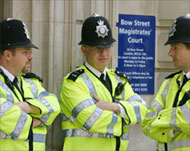Britain lists criteria to deport radicals
The British government has published its measures for excluding or deporting foreign extremists and promised to act against some people within days.

The standards are part of the government’s response to the 7 July bombings that killed 52 people on London’s Underground system and a bus.
“We have a number of names that we are considering at the moment,” said Home [Interior] Secretary Charles Clarke. He added that action would be taken in some cases “very quickly – within a few days.”
Clarke said the criteria included those who foment, justify or glorify terrorist violence; seek to provoke terrorist acts or crimes; or promote hatred between communities. Clarke said the action was taken to meet a “real and significant threat” of terrorism.
Clarke said the measures would be applied in a “a measured and targeted way” and were not intended to stifle free speech.
But Inayat Bunglawala, a spokesman for the Muslim Council of Britain, said the criteria were too vague.
“We are especially concerned that senior Islamic scholars will be barred from the UK purely on the basis of media witch-hunts orchestrated by pro-Israeli elements,” Bunglawala said.
‘Serious attack’
Human rights group Amnesty International branded the measures “a serious attack on human rights”.
The prohibited activities include writing, producing or publishing provocative material; preaching and other public speech; running a website or exerting influence in positions such as a teacher or community leader.
 |
|
The measures are part of UK’s |
“Individuals who seek to create fear, distrust and division in order to stir up terrorist activity will not be tolerated by the government or by our communities,” Clarke said.
“By publishing the list today, I make it absolutely clear that these are unacceptable behaviours, and will be the grounds for deporting and excluding such individuals from the UK.”
He added that “these powers are not intended to stifle free speech or legitimate debate about religions or other issues.”
Britain is seeking agreements with several countries in North Africa and the Middle East to provide assurances that deportees do not face torture or abuse. Britain has refused to deport anyone who is liable to such mistreatment.
Torture question
“Today’s announcement fails to answer the fundamental question: Will the government’s deportation plans result in suspects being sent to countries with a known record of torture?” James Welch, legal director of civil rights organisation Liberty, said.
|
“These powers are not intended to stifle free speech or legitimate debate about religions or other issues” Charles Clarke, |
“We believe it is better for terrorist suspects to be tried than shuffled around the world. If they have to be deported, then at the very least there must be corroboration and robust involvement from international human rights monitors,” Welch said.
Meanwhile, London Mayor Ken Livingstone has threatened to file a case against the British government if it prevented Islamic scholar Sheikh Yousuf al-Qaradawi from entering the country.
Livingstone’s threat followed the home secretary’s statement that he would use his authority to prevent any person who justified or abetted what he called terrorism and violence.